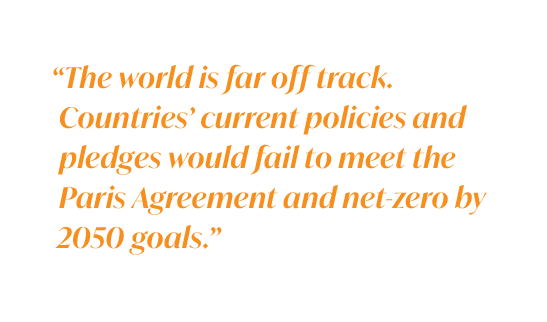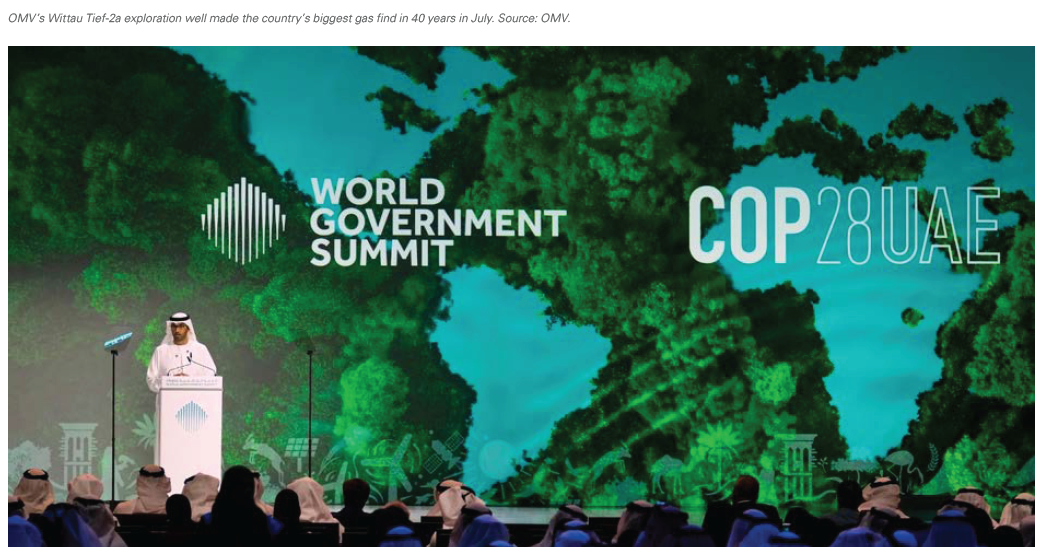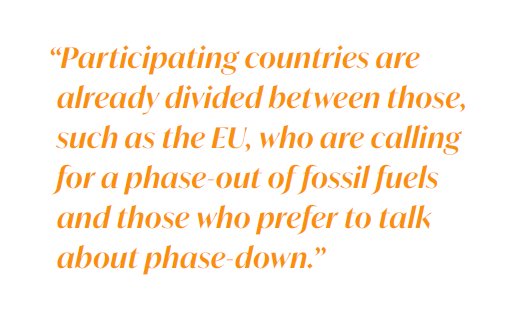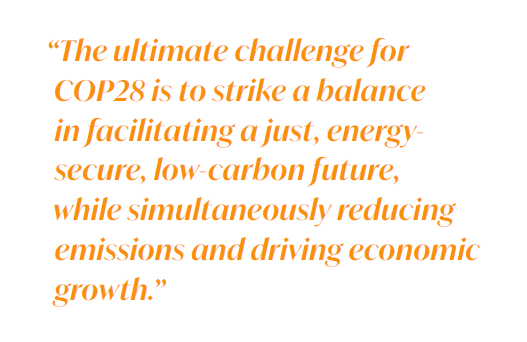Road to COP28 [Gas in Transition]
The COP28 climate talks are scheduled to start at the end of November in Dubai and are expected to set the direction for how the world will tackle and contain the impact of climate change over the rest of this decade. The COP28 summit will be the first formal assessment of countries’ progress towards the Paris Agreement’s target to limit climate change to 1.5oC of warming and it is expected to be intense and contentious.
The biggest issues likely to occupy centre-stage at COP28 are drastic cuts in emissions, the role of fossil fuels, the responsibility of developed countries to aid developing countries with the cost of energy transition and climate change adaptation.
The UN Secretary General Antonio Guterres has been trying to build momentum on the way to COP28. This culminated with the release in September of a review of the progress on meeting the Paris Agreement goals by the UN Intergovernmental Panel on Climate Change (IPCC), referred to as the ‘stocktake’. This takes place every five years and is designed to show how promises compare with what actually happened, and push nations to step up their efforts to reduce emissions, culminating with talks and decision making at COP28.
As expected, the stocktake found that the world is far off track. Countries’ current policies and pledges would fail to meet that goal. Meeting Paris Agreement and net-zero by 2050 goals would require drastic cuts in emissions by 2030 (see figure 1). This has increased pressure on phasing out fossil fuels. But with intermittency of renewables continuing to be a problem, energy security concerns have shifted emphasis to phasing down of fossil fuels. This is expected to be at the centre of talks at Dubai.
Some of the biggest polluters, such as China, but also the oil and gas companies, are pushing for carbon capture, utilisation and storage (CCUS) as the answer to abating energy emissions. This is also supported by big oil and gas producing countries like Saudi Arabia and the UAE. it would allow fossil fuels to be used well into the future, until green technologies develop to provide the energy the world needs reliably and affordably.
There is also a major divide between developing and developed countries over how to cut greenhouse gas (GHG) emissions and especially on who should be paying for the energy transition and the required massive investment in clean energy technologies. The $100bn climate finance promised to developing countries is yet to materialise.
 The fact the UN’s Green Climate Fund, the world’s largest fund dedicated to tackling climate change in developing countries, failed to secure a funding pledge from the US does not bode well.
The fact the UN’s Green Climate Fund, the world’s largest fund dedicated to tackling climate change in developing countries, failed to secure a funding pledge from the US does not bode well.
In his FT interview Sultan Al-Jaber, COP28 president, said he was “optimistic that a loss and damage fund, which was agreed last year to help countries affected by global temperature rises, would be operational by COP28.”
But, as expected, the bluntest message on the road to COP28 came from Guterres at the UN General Assembly in September. Citing extreme weather-related events this year, such as wildfires, floods, droughts and extreme heat, he said that current climate action is falling abysmally short. “G20 countries are responsible for 80% of GHG emissions. They must lead. They must break their addiction to fossil fuels, stop new coal.” He also called for a global phase-out of oil and gas. This will set the tone in Dubai.
But that was not a view shared by China’s special envoy for climate change, Xie Zhenhua. He said in September that “it is unrealistic to completely phase-out fossil fuel energy” and that China opposes fossil fuel ‘phase-out’ language. He also said that China could support a renewable energy expansion target. His views matter as China can help pave the way for a new climate agreement, but can also block it.
Al Jaber’s more sobering views may yet prevail. "We need to be practical, realistic, and sober about what it is going to take, to allow for the world to continue to evolve and to progress, and to grow in a way that is responsible, while also building the new energy system that will consist of zero unabated fossil fuels."
Are renewables up to it?
The biggest expansion of renewables is in the electricity sector. Penetration in other energy sectors, and especially in energy-intensive industries, remains slow and costly.
Intermittency remains unsolved and energy security remains a major concern. What the world needs are reliable energy supplies. That means that renewables alone cannot do it, requiring continued dependence on fossil fuels well into the future.
Electricity comprises only 17.4% of global primary energy, growing steadily but slowly, but not as fast as hoped and it will take time before it can dent fossil fuels.
As Xie said, phase-out of fossil fuels is unrealistic, as long the intermittency of renewables and lack of a ready supply of large long-term battery storage infrastructure remain a problem.
And to cap it all, hydrogen is not rising to the occasion. A recent report by the International Energy Agency (IEA) stated that green hydrogen is facing strong headwinds due to "stubborn cost pressures" and "slow" implementation of governments' economic support systems.
In the meanwhile, the IEA updated its roadmap to net-zero energy-related CO2 emissions and not surprisingly this is getting narrower and is becoming even more hypothetical. CO2 emissions rose again last year.
The role of natural gas
As the world intensifies its efforts to decarbonise and reach net-zero by 2050 goals, the intermittent nature of renewables makes natural gas key to a reliable energy transition.
 As Saad Al-Kaabi, Qatar's Minister of State for Energy Affairs and President of QatarEnergy, said in Tokyo recently, “a balanced energy transition demands the incorporation of natural gas in our present and future energy…natural gas will be indispensable, especially given its reliability as a base-load source for many nations and for many years post-2050.” He added “Our duty is two-fold: advancing renewable capacity while sustaining a robust baseload capability.”
As Saad Al-Kaabi, Qatar's Minister of State for Energy Affairs and President of QatarEnergy, said in Tokyo recently, “a balanced energy transition demands the incorporation of natural gas in our present and future energy…natural gas will be indispensable, especially given its reliability as a base-load source for many nations and for many years post-2050.” He added “Our duty is two-fold: advancing renewable capacity while sustaining a robust baseload capability.”
Even IEA’s and BP’s net-zero scenarios lead to substantial, continuing, amounts of oil and gas consumption by 2050. Natural field decline rates without reinvestment exceed projected rates of declines in demand, requiring new discoveries.
Use of natural gas strengthens energy security, ensures equitable energy access and bridges the energy poverty gap that still affects millions of people. And above all, it helps the world switch away from coal. That will be the message at COP28.
With over 20 companies ready to support an initiative targeting ‘near-zero’ emissions of methane across their entire value chain by 2030, the role of natural gas in energy transition will be strengthened.
IEA’s prediction in September that the world is on the “cusp of a historic turning point,” with the burning of fossil fuels set to peak within the next few years, and before 2030, is likely to prove to be wishful thinking. Based on current trends and policies – BP World Energy Outlook - gas demand is expected to carry on rising, by as much as 20% by 2050, driven by demand in Asia.
Oil and gas company decarbonisation initiative
Al Jaber said in an interview in the FT in October that he is in talks with oil and gas producers about an initiative focused on cutting GHG emissions, with the aim of launching it at COP28.
Companies that back this will be asked “to commit to reaching net-zero emissions by 2050, as well as a target of ‘near-zero’ emissions of methane across their entire value chain and eliminate routine flaring by 2030.”
Al Jaber said that more than 20 companies, both IOCs and NOCs, making up to a quarter of global oil and gas production, are ready to sign up to the initiative - called Global Decarbonisation Alliance. He is applying pressure on others to join.
He is also urging the oil and gas industry to “step up its game” and invest more money in clean energy. He supports development of clean energy to phase out oil and gas production as soon as possible. The question, though, is by when?
In an industry event in September, the CEOs of Saudi Aramco and ExxonMobil confirmed support for the global transition to clean energy, but they also said oil and gas will continue to play a major role for decades to come. They supported the use of CCUS to reduce emissions from the use of fossil fuels. But they warned that cutting oil and gas use too quickly would be dangerous, given the growing global demand for energy.
ExxonMobil CEO Darren Woods characteristically said “There seems to be wishful thinking that we’re going to flip a switch and we’ll go from where we’re at today to where it will be tomorrow.” Transition is a lengthy process. And while that is happening “if we don’t maintain some level of investment in the [oil and gas] industry, you end up running short of supply, which leads to high prices.”
Amin Nasser, CEO Saudi Aramco, was unequivocal: “I see many shortcomings in the current transition approach that can no longer be ignored…Phasing-out conventional energy prematurely could put energy security and affordability priorities at risk.” These realities can no longer be ignored or wished away.
 OPEC is confident oil and gas demand will carry on increasing well beyond this decade and pushed back IEA’s projections that fossil fuel demand would peak this decade.
OPEC is confident oil and gas demand will carry on increasing well beyond this decade and pushed back IEA’s projections that fossil fuel demand would peak this decade.
At ADIPEC it became clear that oil and gas producers want to be part of the energy-transition discussion at COP28 but they will be stressing the need for reliable supplies and that it will take a long time before renewables can deliver these on their own.
During recent conferences and industry events it has become clear that the oil and gas industry is now prepared “to hit back against its critics and to fight for control over the narrative surrounding the global energy system’s transformation to limit the impact of climate change.”
A common approach is emerging. “Yes, climate change is real and carbon emissions must be cut, but oil and gas are still essential in meeting world energy demand, and the industry can do that while engineering a solution to aggressively slash emissions.”
At ADIPEC, Al Jaber rallied the industry to decarbonise and align around net-zero by or before 2050. He said that “This industry can and must help to drive the solutions. For too long, this industry has been viewed as part of the problem, that it is not doing enough and, in some cases, even blocking progress. This is your opportunity to show the world that, in fact, you are central to the solution.”
Challenges
Earlier in the year, the UN Secretary-General Antonio Guterres, called on countries to phase-out fossil fuels and “to leave oil, gas and coal in the ground where they belong.” Given the outcome of the stocktake, he is expected to pursue this even more strongly at COP28. The elephant in the room will be “the burning of fossil fuels.”
Expect fierce arguments at COP28 between future use of abated and unabated fossil fuels. Participating countries are already divided between those, such as the EU, who are calling for a phase-out of fossil fuels and those who prefer to talk about phase-down, seeing a role of CCUS and emissions abatement in the energy transition, such as China and Saudi Arabia.
But the question at COP28 will be: “Can you bring CCUS to scale? Can you get it to work well enough and big enough so that the world stays within the Paris agreement goals?
Saudi energy minister, Prince Abdulaziz bin Salman, warned that “politicians must be honest about the challenges ahead, and the risks if the shift isn’t managed well.”
An article in the FT in September warned that populism could derail the green transition. Most western politicians have embraced a convenient half-truth about climate change. That the journey to net zero is not only essential for the environment but will also be good for the economy. This glosses over the transitional costs. The switch away from fossil fuels is very expensive, as Europe is already finding out.
Nevertheless, Ursula von der Leyen, President of the European Commission, said major polluters should match the EU’s goal that “unabated fossil fuels are phased-out well before 2050.” The EU will push for the goal to triple global renewable energy capacity and double energy efficiency improvements by 2030. But using a softened language to reach a unanimous decision, the EU will also push for a “predominantly fossil-free” global energy sector “well before 2050” and strive to reach a “fully or predominantly decarbonised power system in the 2030s.”
John Kerry recently said “We have to get the fossil fuel industry at the table. We have to bring them to this effort, and they have to join in by being responsible.” He urged the executives of big energy players to attend COP28 with concrete plans to tackle GHG emissions. Oil and gas industry executives intend to do just that, but they plan to deliver their own message, on their own terms.
The ultimate challenge for COP28 is to strike a balance in facilitating a just, energy-secure, low-carbon future, while simultaneously reducing emissions and driving economic growth.
All countries were required to submit updated ‘nationally determined contributions’ (NDCs) by September with emissions reduction commitments, but response so far has been very disappointing. There is no appetite among governments to revise NDCs yet. Will COP28 change that? It will be a challenge
Al Jaber said earlier in the year "We cannot shut down the energy system of today before we build the new energy system of tomorrow that is equipped with zero-carbon emission sources." He also said “The phase down of fossil fuels is inevitable. It is in fact essential. But it cannot be irresponsible. We must manage this transition, ensuring energy security, accessibility and affordability, while also sustaining socio-economic development. The speed of the transition will be driven by how quickly we phase-up zero carbon alternatives.”
An easy rallying point, that Al Jaber has seized, is agreement to “pursue and encourage efforts to triple renewable energy capacity” by 2030, something already agreed by the G20.
This is included in the conditions identified by the IEA for the COP28 summit to be considered successful. Others include doubling of energy efficiency improvements by 2030, an agreement on mechanisms to support clean energy financing in emerging countries and getting the loss and damage fund up and running.
But political tensions between the US and China will not help. Conferences and events this year leading to COP28 have shown glaringly that there are deep divisions over how to combat global warming. These are expected to overshadow the climate summit, making agreement on new climate targets a challenge. And yet, alarming weather-related events this year show that energy transition must be accelerated.



